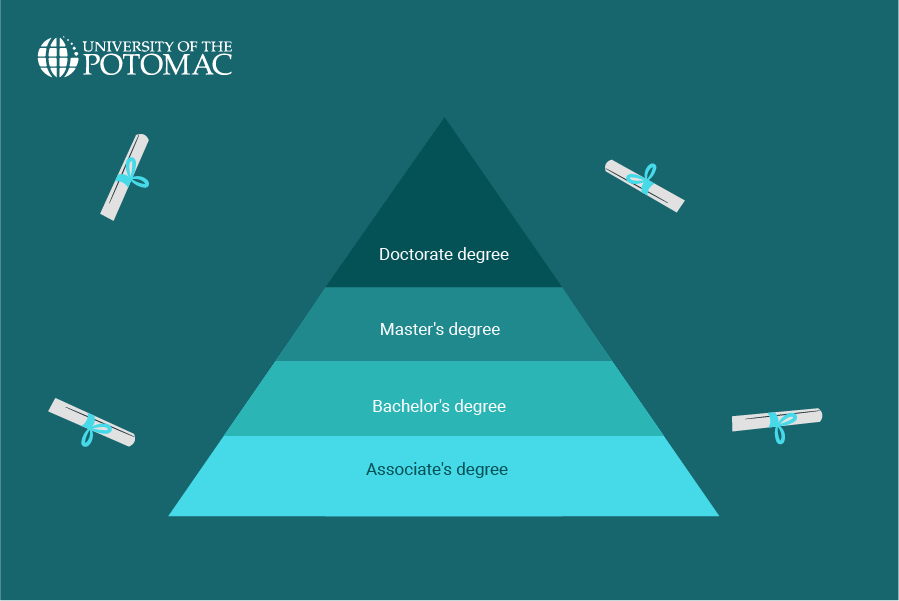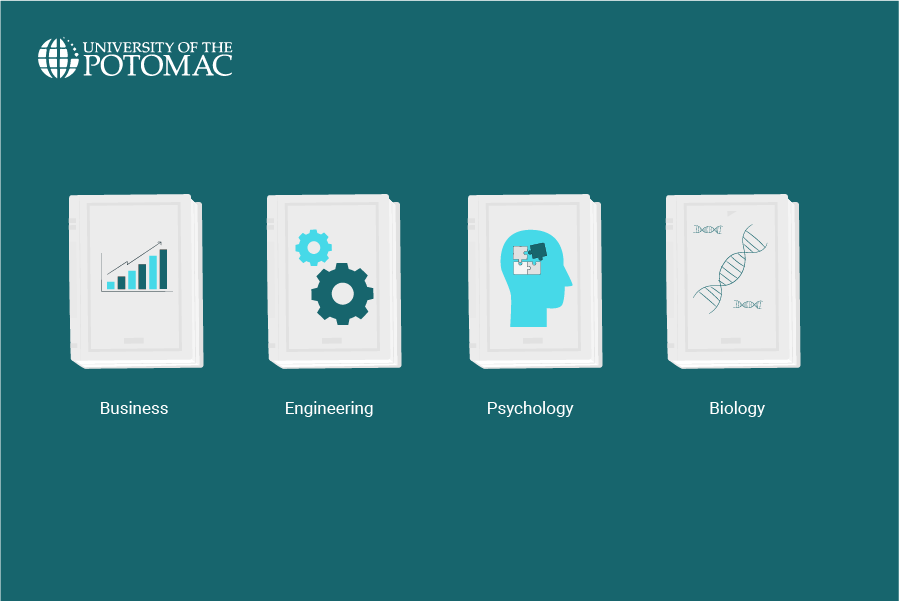The main difference between a degree and a major is that while a degree is conferred upon you when completing all the requirements for graduation, a major is the specific area of study you focus on while completing your degree. Read on to learn more about the differences between a degree and a major.
When you embark on a journey to pursue higher education you may have heard words like “degree” and “major” multiple times and often interchangeably. With the confusion surrounding the definition of a degree and a major, understanding the relationship between the two will help you make wise decisions about your education.
So, join us in exploring the difference between a degree and a major and learning how to use these terms appropriately.
What is a Degree?
A degree is an academic credential awarded to you by colleges and universities upon completing a course of study. Such a credential is typically awarded after completing a specific number of credits, fulfilling general education requirements, and meeting any other criteria set by the institution issuing the degree.
When you earn a degree, it signals that you hold a level of proficiency and knowledge in a specific field or discipline. It is the culmination of a well-rounded education, through which you equip your intellect with a broad range of skills you can utilize in various career paths. On top of the technical skills you gain from the field you have pursued, acquiring a degree includes a significant development of your critical thinking, problem-solving, research, and communication skills, all critical abilities to thrive in your career
Besides, a degree provides a sense of personal accomplishment and fulfillment, representing years of dedication and hard work. For most degree holders, it signifies a lifelong goal and a momentous milestone in their educational journey.
Levels of Degrees

When pursuing higher education, there are many types of degrees you can earn. University degrees are categorized into different levels based on the depth and complexity of the subject matter, such as undergraduate and graduate degrees.
For example, undergraduate degrees include associate and bachelor’s degrees, whereas graduate degrees include master’s and doctoral degrees. While they come through a rank, each degree plays a unique role in your academic and professional journey. Let’s explore each of them in more detail.
Associate’s Degrees
Associate’s degrees are two-year programs that prepare you to enter the workforce immediately upon graduation. You can obtain this credential from a community college, online university, or junior college. While the field of studies you can obtain an associate degree are vast, the most common fields and career paths that require one include radiation therapy, respiratory therapy, aviation maintenance, occupational therapy assistance, radiologic and MRI technology, dental hygiene, etc.
Here at POTOMAC, we offer associate’s degree programs in business, information technology, early childhood development, and network security management. These programs allow you to lay an educational foundation for your future career.
A common benefit of an associate degree is that you can transfer the credits of your associate degree, and, after another 2 years of studying, pursue a bachelor’s degree.
Bachelor’s Degrees
Continuing in the realm of undergraduate studies, a bachelor’s degree is a four-year program offered by colleges and universities. Such a degree exposes you to vast knowledge of the specific area of study you pursued (and wish to have as a career in the future).
Typically, in the first two years of a bachelor’s degree, you complete general education requirements such as math, English, and science, followed by the last two years of specialized courses related to your chosen major.
Bachelor’s degrees offer a broad variety of subjects—more than any of the other levels of degrees. POTOMAC’s bachelor’s degree programs are vast, including international business, early childhood development, government contract management, computer science, business, and much more.
While a bachelor’s degree is often the first milestone to reaching your career dreams, earning a bachelor’s degree has several benefits, most notably a higher potential income and increased job opportunities.
Master’s Degrees
A master’s degree is an advanced program that usually requires one to three years of studying, only after you possess a bachelor’s degree. The essence of this degree is to procure specialized knowledge and advanced skills in a particular field.
Regardless of your specific field, continuing your education offers numerous advantages. Typically, the benefits of earning a master’s degree include increased earning potential, a competitive edge within your career field, and access to new job opportunities.
If you’re interested in furthering your education and enjoying the benefits of earning a master’s degree, check out our master’s degree programs. You can find programs across various fields, from business administration to education and healthcare administration. These programs combine theory and applied research to provide quality education and put you on a fast track to success.
Doctorate Degrees
On the highest level of academic achievement sits a doctorate degree. It typically requires three to seven years of study only after you possess a master’s degree.
This credential is characterized by a strong emphasis on original research and the contribution of new knowledge to the field you are pusuing. As a doctorate candidate, you get to engage in an in-depth exploration of your area of expertise, culminating in the completion of a dissertation or thesis.
This degree is usually obtained by those who want to position themselves as thought leaders in their respective fields and contribute to the body of knowledge. If you see yourself in this role, consider POTOMAC’s doctorate programs such as those in business administration, computer science, or education.
What is a Major?
Now that we have defined the credentials you obtain when pursuing higher education, we shift the focus to the field of study within the degree—the major. This is the field of study you pick when applying to universities.
In addition to the core requirements, the major you pick determines the types of specialized courses you’ll pursue in the last years of your undergraduate studies. This allows you to gain in-depth knowledge and skills in a specific subject area and prepares you for graduate work or the job market.
Common Majors

While the degrees are standardized, majors determine the type of career you will follow upon graduation. Fortunately, there’s an abundance of majors you can choose from, which guarantees that you can find one that aligns with your personal interests and goals.
If you’re still uncertain about which field you want to study, here are several examples of popular college majors:
Interested in pursuing a degree?
Fill out the form and get all admission information you need regarding your chosen program.
This will only take a moment.
Message Received!
Thank you for reaching out to us. We will review your message and get right back to you within 24 hours.
If there is an urgent matter and you need to speak to someone immediately you can call at the following phone number:
- We value your privacy.
- Biology: A biology major allows you to study humans, plants, animals, and their environments from the cellular to the ecosystem levels. After graduating, you can pursue a career as a research assistant, biostatistician, biologist, and more.
- Business: A business major explores fundamental business principles and practices that enable organizations to run smoothly. As a business major, you can pursue various career paths, including a marketing executive, financial analyst, accountant, and more.
- Engineering: An engineering major provides you with the knowledge and skills to design and build things. Although coursework depends on the type of engineering, all programs focus on developing skills in project management, problem-solving, and graphical communication. As an engineering major, you can specialize in electrical engineering, civil engineering, chemical engineering, etc.
- Psychology: A psychology major allows you to study the human mind and behavior. After graduating, you may pursue careers in counseling, clinical psychology, developmental psychology, cognitive psychology, etc.
What is the Difference Between a Degree and a Major?
Now that we explained in depth what a degree and a major are, let’s break down in simple terms the key differences between a degree and a major:
- Scope: A degree represents the overall qualification awarded upon the completion of a specific education program. While a major is a focused area of study within a degree program.
- Purpose: A degree certifies that a student has completed a comprehensive program of study at a specific educational level, while the purpose of a major is to provide in-depth knowledge and skills in a specific discipline.
- Duration: The duration of a degree depends on the program and level, with the duration of a major embedded within the duration of the degree program.
- Flexibility: Degrees offer some flexibility regarding elective courses, but students must generally meet the broad curriculum requirements of the degree program. While majors offer more flexibility within their specialized area, allowing students to choose from various courses related to their field of study.
- Impact on career: A degree can impact a career by providing a basic qualification required for entry into many professions and job markets. On the other hand, a major has a more direct impact on a career path, as it indicates specific expertise in a particular field.
What is the Difference Between a Double Major and a Dual Degree?
If you’re someone with diverse interests or a clear view of a career path that covers multiple disciplines, you may be considering pursuing either a double major or a dual degree in college. But what makes these options so different?
A double major allows you to earn a single degree with two areas of specialization. This means you fulfill the requirements for two distinct areas of study within the same college. A double major helps you achieve a more extensive education without adding to the years of studies needed to earn your degree. The requirements for a double major typically involve the completion of 120 credits.
On the other hand, a dual degree involves earning two separate degrees simultaneously. Because different degree types have different requirements, a dual degree can take longer than four years to complete.
Many schools offer a list of dual degrees that complement one another, and in this way, help you prepare for a unique career path. Such a degree allows you to gain in-depth knowledge and develop applicable skills in two disciplines, diversify your career options, and help you qualify for managerial positions.
Although the requirements vary depending on the school and programs, in general, a dual degree requires up to 150 credits to graduate.
How to Choose a College Major?
Choosing a college major is one of the most important decisions you’ll make in your educational journey. However, you don’t need to be intimidated by the decision. Here are some tips you can follow to ease the decision:
- Reflect on your interests and strengths to ensure you enjoy learning about the topics
- Consider your career goals and map the path you need to reach there
- Research majors that have piqued your interest
- Seek advice from academic advisors, faculty, and professionals in the field
- If needed, take introductory courses in different subjects to narrow down your interests
Conclusion
Both a degree and a major are crucial in shaping your educational and career trajectory. A degree encompasses a broader education, while a major allows you to specialize in a specific field, gaining in-depth knowledge and expertise.
Now that you know the differences between a degree and a major and how each helps you shape your future, you can take the first steps toward your dreams. Contact us and find out more about what your educational journey can look like.
Frequently Asked Questions
Difference between a major and a minor?
The main difference between a major and a minor is that a major is your primary specialization, and a minor is your secondary concentration. A major also requires more courses and credits than a minor.
Can you change your major?
Yes, you can change your major. However, doing so can lengthen your studies, as different majors have different course requirements.










